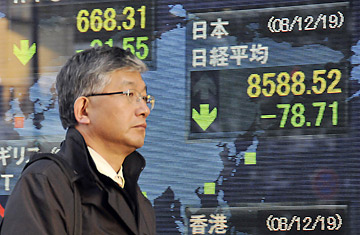
A pedestrian walks in front of a share prices board in Tokyo on December 19, 2008. Japan's share prices fell 78.71 points to close at 8,588.52 points at the Tokyo Stock Exchange.
For Japanese consumers, there is some benefit to a stronger yen: walk into a local supermarket and one might see imported items that are specially marked down, giving new meaning to a "yen appreciation" sale. But a major concern for the Japanese economy is that currency rates, the dollar-yen in particular, are pummeling Japanese exporters as their products lose competitiveness abroad. Coupled with a general decline in global demand, the weak dollar-yen is dumping ice water on corporate profits at titans like Sony and Honda.
With the exchange rate hovering just below 90 yen to the dollar, and having risen to 87 on Wednesday after the U.S. cut interest rates, the Bank of Japan decided on Friday to cut its benchmark rate to 0.1%. The move was done on a near unanimous vote among policy makers. However, with its overnight rate already at 0.3%, it is unclear what such a small rate cut could achieve.
Despite Friday's move, currency experts say that the yen could possibly climb to 85, which could trigger direct government intervention to halt the rise. Upon speculation that the lower 80s could be reached within weeks, Japan's Finance Minister Shoichi Nakagawa confirmed Thursday that Japan was prepared to intervene and sell the yen, something the Japanese government has not done since March 2004.
A 10% appreciation of the yen slashes Japan's GDP growth rate by 0.3% to 0.4% points, says Masafumi Yamamoto, head of foreign exchange strategy for Japan at Royal Bank of Scotland. "Yen appreciation is also causing the Nikkei [stock index] plunge," he says. And that's affecting the confidence of Japan's businesses. On Monday, figures of the Bank of Japan's tankan survey, a quarterly survey of business sentiment in Japan, fell to a seven-year low. The tankan figure showed the steepest quarter over quarter decline in 34 years. The economy is expected to decline 0.8% for the fiscal year ending in March 2009.
Any company betting on a yen reversal may have a long wait. Tohru Sasaki, chief currency strategist in Tokyo at JPMorgan Chase & Co., believes the dollar-yen exchange is reaching a sustainable average. "The yen's level until last year was abnormally weak. Now it's coming back to normal," he says. Compared to the mid-1990s, he says, the strong yen's negative impact on the Japanese economy is "not that large." To have the same effect as the postwar peak in 1995, the exchange rate would have to reach 48 yen to the dollar, he says, because the U.S. economy has experienced 40% cumulative inflation while Japan has remained relatively flat. "If we think about the inflation rate differentials, the yen is not that strong right now."
Satoru Ogasawara, economist for Credit Suisse in Tokyo who covers foreign exchange, expects the yen to advance to 85 to the dollar within three months and to 83 over the next year. Intervention, he says, will come at the 85-level, but even then it is difficult to predict what will happen. "What we're seeing is the unwinding of the yen carry trade," says JPMorgan Chase's Sasaki, referring to the practice of buying low-interest yen and investing it in high-yield currencies. "It's a very strong and powerful movement and it's difficult to stop it. I think that Japanese officials understand that and that's why they haven't intervened."
